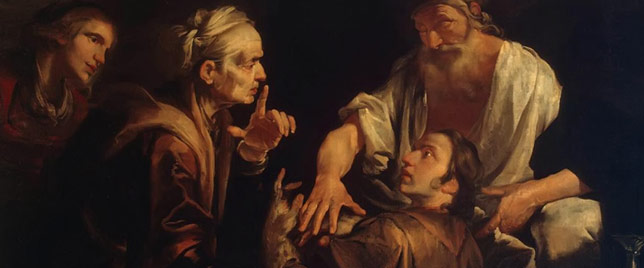Decided to spruce up my blog a bit, perhaps in some vain attempt to make up for letting it fall into disuse, yet again. No worthy excuses this time. Must. Blog. Regularly. All I need is a little faith.
Anyways, the new picture in my header is a cropped version of Isaac Blessing Jacob (1640) by Gioacchino Assereto (1600-1649), an Italian Baroque painter. I find it interesting that Jacob seems hesitant in Assereto's interpretation of the story, whereas he is very obviously a willing participant in my own reading, only initially giving minor protest that Isaac might feel his soft skin. Instead of the crafty mother instigating her trickster son, Assereto's Rebekah comes across as the sole schemer, a domineering hag of sorts. Poor Esau looks on with his dumb, kind eyes, although he is supposedly not present until Genesis 30, immediately after the blessing.
As an educated Catholic in 17th century Italy, Assereto may have been well-versed in Latin. Yet, the majority of his Biblical knowledge and interpretations were most likely gleaned second-hand from the words of clergymen. Thereby, Assereto's depiction of Jacob as an almost vulnerable figure keeps him in a positive light, staying in line with church doctrine. Rebekah, on the other hand, occupies a space of power. By controlling the swindle, Assereto's Rebekah upholds the prevailing mores of the times, in which insubordinate or strong women were regarded as manipulators. Ironically, had Rebekah not prompted Jacob, he would have never attained his requisite blessing.
Of course, I could have this all wrong. Giacchino Assereto may very well have been a feminist for his day, depicting Jacob as weak and Rebekah as strong and willful. Given his proclivity towards Biblical paintings typical of the Baroque era, however, I doubt he was much of a revolutionary. Admittedly, I may be making a mistake in pointing out the timing inconsistencies (i.e. Esau presence, Jacob hesitating/protesting after putting on the goat skins, et cetera). Paintings often compress time, in both linear and nonlinear fashions. As such, Assereto may have attempted to display the events of Rebekah and Jacob's deception all at once, taking the necessary liberties to create a static image that effectively tells a story. At least I can reach one conclusion: no matter the artist's intention, I find the painting fascinating.
Below is a full version of the Isaac Blessing Jacob, along with others by Assereto. Note the anachronisms -- those Semites and Egyptians sure look like Renaissance-era Italians!


The Finding of Moses, c. 1640

Moses Drawing Water from the Rock, date unknown

Tobias Healing the Blindness of His Father, date unknown


